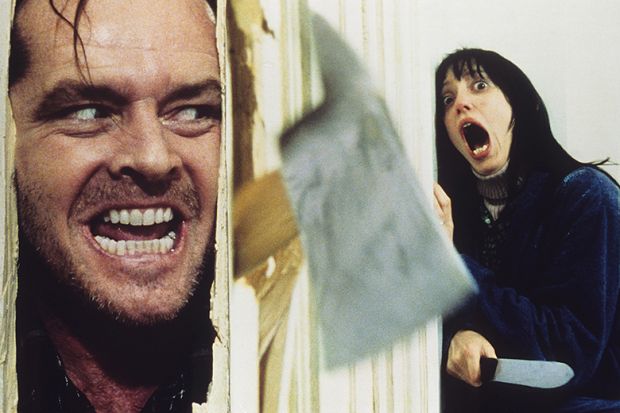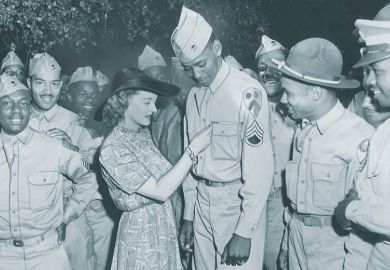The Shining, argues K. J. Donnelly, is “the most well-known cult film”. Whether it has earned that moniker is debatable, but Stanley Kubrick’s 1980 film has certainly inspired reams of scholarly analysis, YouTube fan videos, blogs and a documentary devoted to unlocking its purported secrets, Rodney Ascher’s Room 237 (2012). Vivian Kubrick’s film Making “The Shining” (1980) incorporates the only extant footage of her father at work. There’s even a podcast dedicated to parsing the film 2 minutes and 37 seconds at a time. This outpouring, or deluge – millions of words written and uttered by thousands of people – has reached an “almost Biblical level of exegesis”, Donnelly says, giving it the status of “quite possibly the most scrutinised film of all time”. This raises the question: do we need yet another book on The Shining and has its author done enough to justify its publication?
Before I answer that question, one must ask: what is it about this seemingly simple “ghost story” that has inspired such devotion? Part of the mystery lies in its creator. Kubrick has earned the (undeserved) reputation of being a hermitic, Howard Hughes-like, paranoid individual, cut off from the world. So allegedly reclusive and anonymous was Kubrick that a man could get away undetected with impersonating him for several years.
Meanwhile, he has been canonised, Donnelly points out, as an “infallible perfectionist” with “overwhelming, God-like control and agency”, so any continuity errors or ambiguities in his films are interpreted as coded messages. And The Shining is full of them: the hotel’s structural impossibilities, the hedge maze that is not visible in the opening establishing shot, the scrapbook that goes nowhere, the uneasy tension between the psychological and the supernatural, to cite just a few. These have spawned a host of theories, that The Shining is about the Holocaust, the genocide of the Native Americans – or Kubrick’s confession for having faked the moon landings.
To give a taste of the book’s analysis, Donnelly notes how Roger Luckhurst (author of the first English-language book specifically on the film) misspelled hotel manager Stuart Ullman’s name as “Ullmann”. This, Donnelly suggests, makes him “appear more Germanic and less Jewish” and is “a subliminal spelling mistake, registering the unconscious impact and undercurrent of transposed Holocaust memory in The Shining”. Such laser-like criticism is most welcome but is ironically and immediately undercut by the author’s own misspelling of Kubrick’s wife’s uncle – the notorious Nazi film-maker Veit Harlan – as “Veidt”, registering his own “unconscious impact and undercurrent of transposed Holocaust memory” in The Shining, for Conrad Veidt famously played Major Strasser in Michael Curtiz’s Casablanca (1942).
Although Donnelly largely omits some newer scholarship from his coverage, I did learn one or two things. One of the most prominent musicians used in the film, singer Al Bowlly, was killed by a Luftwaffe bomb in 1941. The very same section of Bartok’s Music for Strings, Percussion and Celesta was used in a 1968 Doctor Who story, “The Web of Fear” – a show we know Kubrick watched.
Nonetheless, despite the criticisms, Donnelly’s succinct book (a mere 128 pages) provides a useful trail of crumbs for navigating through the particularly labyrinthine scholarship and criticism surrounding this film.
Nathan Abrams is professor of film studies at Bangor University and the author of Stanley Kubrick: New York Jewish Intellectual (2018) and Eyes Wide Shut: Stanley Kubrick and the Making of His Final Film (with Robert Kolker, 2019).
The Shining
By K. J. Donnelly
Wallflower Press
144pp, £11.99
ISBN 9780231187237
Published 3 July 2018
POSTSCRIPT:
Print headline: Still keeping us in suspense
Register to continue
Why register?
- Registration is free and only takes a moment
- Once registered, you can read 3 articles a month
- Sign up for our newsletter
Subscribe
Or subscribe for unlimited access to:
- Unlimited access to news, views, insights & reviews
- Digital editions
- Digital access to THE’s university and college rankings analysis
Already registered or a current subscriber? Login







